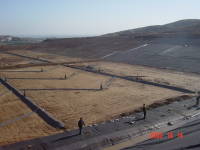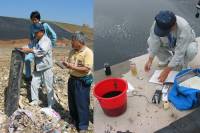Background
 Construction site in Weifang
Construction site in WeifangPursuant to the understanding reached in August 2001 between UN-HABITAT and the Ministry of Construction of the Government of the People's Republic of China, UN-HABITAT has been assisting the City of Weifang (Shandong Province) in developing a landfill based on the design principles of a semi-aerobic landfill known as the Fukuoka Method. The overall objective of this initiative is to enable the target city to manage its municipal solid waste in an environmentally responsible manner. Once the project is finished and its efficiency established, China could replicate the design in other cities as well. In this endeavour, Fukuoka City and Fukuoka University have joined forces with UN-HABITAT to form an advisory group providing continuous technical support to Weifang. In addition, experts working in the private sector in Fukuoka have been mobilised on a voluntary basis to contribute to the project through the Technical Advisory Group.
Results
 Gas & leachate monitoring
Gas & leachate monitoringWith the support of the Technical Advisory Group, Chinese experts undertook the design work and Weifang City finished construction of the Fukuoka Method landfill over 6.4 ha in October 2003. The landfill has the capacity of 1.1 million MT and will eventually cover 35 ha. Since then, the landfill has been receiving waste generated in the city. A leachate treatment facility and a laboratory have also been constructed and the environmental monitoring is going on.
Following the submission of the Technical Evaluation Report (first draft) to the Chinese counterparts, the Office fielded a mission to Weifang in September 2004 to discuss the performance of the project with officers from Weifang City, relevant departments of the Shandong Provincial Government, and the Ministry of Construction. It was concluded that monitoring of leachate should be carried out over an extended period in order to properly evaluate the effectiveness of the landfill project, the monitoring data should be sent to Fukuoka on regular basis for analyses, and a few improvement measures identified in the Evaluation Report (draft) should be carried out.
In April 2005, six delegations of Shandong province visited Fukuoka for site visit and to exchange views on future course of action outlined above with UN-HABITAT.
Related Reports and Articles:
Technology Transfer: "The Fukuoka Method (Semi-aerobic) Type Landfill Project, Weifang City
Partners
China: Ministry of Construction; Shandong Province Government; Weifang City Government
Partners: Fukuoka: UN-HABITAT, Fukuoka City, and Fukuoka University
- Low Carbon Economy and Sustainable Urban Development Pilot Project – Jiangyin Non-Development Zone Practice
- Earthquake-resistant Reconstruction of Hongshe Primary School
- Getting Children Back to School (Completed)
- Promoting Sustainable Urbanisation
- Semi-Aerobic Landfill System (Completed)
- Urban Indicators Project (Completed)






































